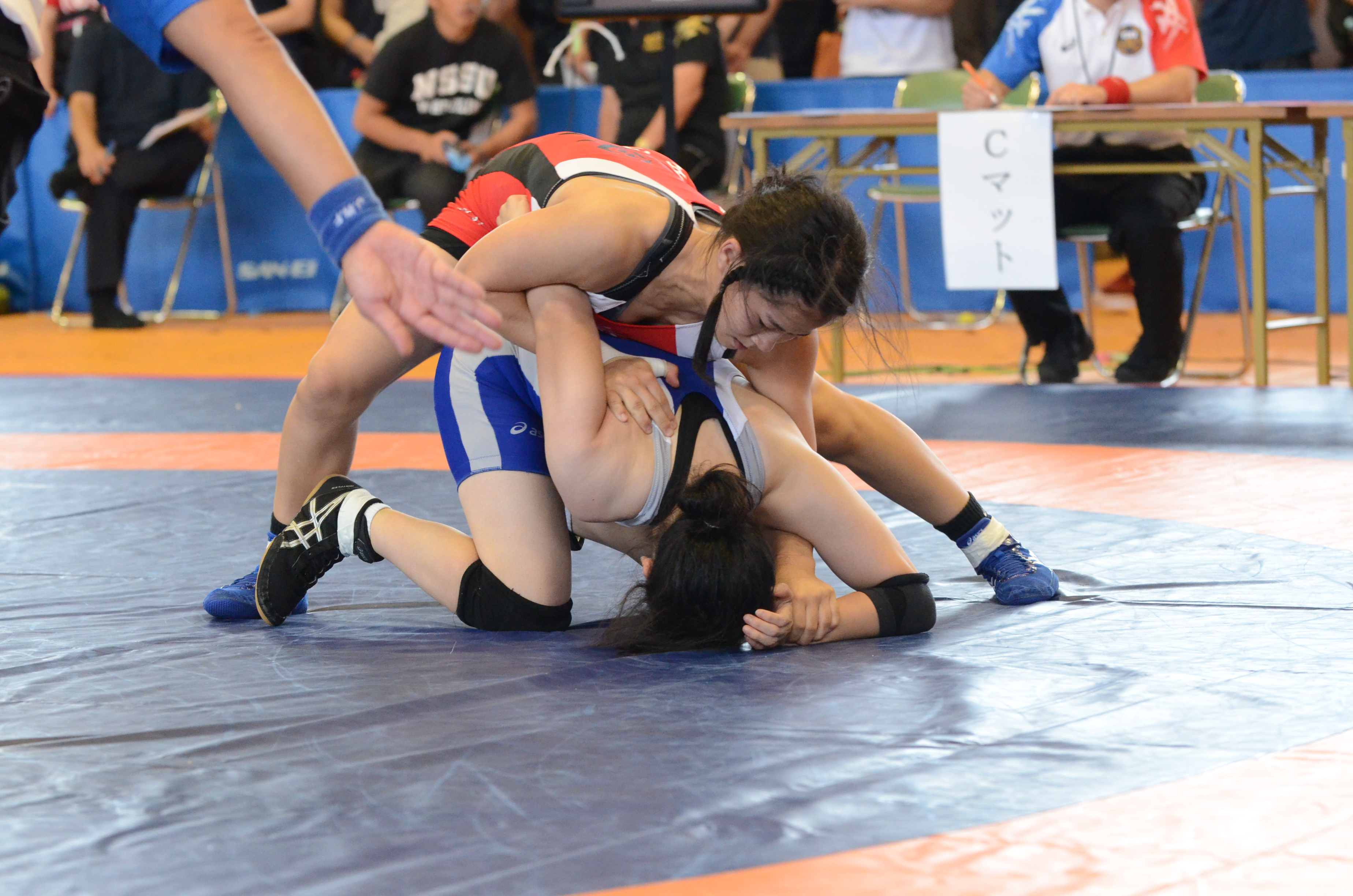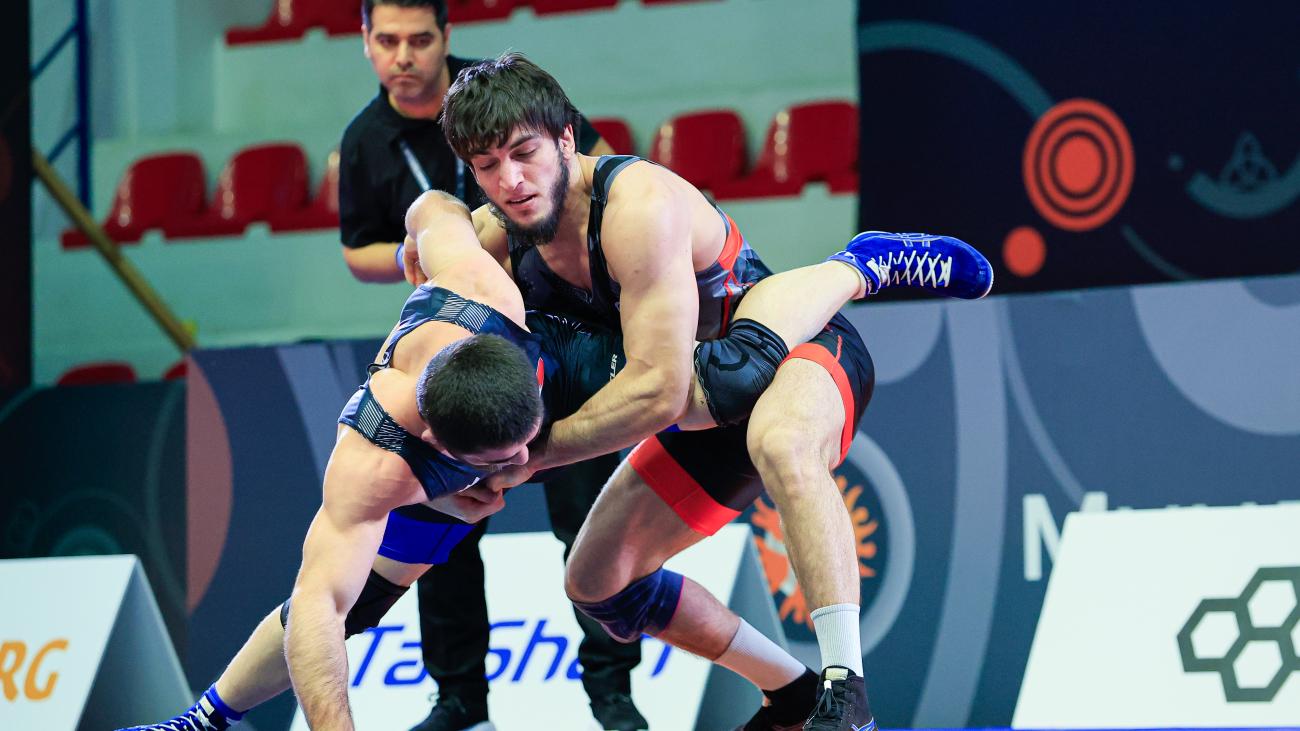MISHIMA, Japan (Sept. 24) - Thirteen months and one foot surgery after winning a gold medal at Rio 2016, Eri TOSAKA returned to the mat with a performance that put her back on the path to Tokyo 2020 -- while also showing she still has a way to go.
Tosaka, the 48kg Olympic champion, recorded three technical falls in winning the 53kg title at the All-Japan Women's Open, but also had her share of anxious moments after falling behind in both the semifinal and final and looking somewhat sluggish throughout.
"It was my first tournament since the Olympics, and I was tighter than usual," Tosaka said. "My timing was off , and it was tougher than I thought it would be."
In the final, Tosaka gave up an opening takedown to Arisa TANAKA, but stormed back to win 12-2, ending the match at 5:18. The result was a repeat of their semifinal match at the 2015 All-Japan Championships, which had the same score but lasted 10 seconds less.
Tosaka's biggest scare came in the semifinals, when she found herself trailing 6-0 after just 30 seconds against unheralded Nao TANIYAMA of Hosei University. Taniyama swept in for a single leg takedown, then rolled the three-time world champion twice.
That lit a spark in Tosaka, who quickly scored with a pair of takedowns and a roll to tie the score at 1:40. She then pancaked Taniyama for another two points, then finished off the comeback by reeling off four straight ankle rolls for a 16-6 win at 2:46.
"I thought I was going to lose," Tosaka said of falling behind by six points. "I really don't remember it so clearly. I was worried."
Taniyama was as surprised as anyone to put the Olympic champion in such a predicament, but praised the way she kept her composure and fight back.
"At first, I thought I would win when I got six points," Taniyama said. "But she showed the mental strength that comes with experience. She's also strong physically."
The senior division of the tournament offers the winner a berth in the All-Japan Championships in December, the first of the two major qualifying tournaments for the Olympics, world championships and other big meets. As world-class wrestlers such as Tosaka would normally be included in the All-Japan field anyway, they rarely enter the Japan Women's Open.
But Tosaka saw it as a necessary step in her comeback in consultation with her coach Kazuhito Sakae, the national team director and head of powerhouse Shigakkan University.
Tosaka, who turned 24 last month, revealed that she had felt feverish and did not practice in the two days before the tournament, held in this small city 120 kilometers southwest of Tokyo.
"It was my fault for not taking better care of myself," said Tosaka, who considered pulling out, but figured it was best in the long run to gain the experience.
"We talked about how if she wants to enter the All-Japan this year and then go to the next world championships, she has to get at least one domestic tournament under her belt," Sakae said. "She trained extra hard at Shigakkan and at the national training camp. Then two days ago, I got a message asking if it was OK to stay out of practice. She was in bad shape. I told her to rest up.
"There is pressure on her, and she realized she had to overcome that," Sakae said. "She told me she was nervous. But it's a big difference to have matches or not, and to risk her reputation as a champion, I have to admire her bravery for competing here."
After winning the gold in Rio, Tosaka suffered from chronic pain in her left big toe and finally decided to have surgery to remove calcium deposits in January. She had planned to enter the All-Japan Invitational Championships last May to qualify for the world championships in Paris, but her recovery did not progress enough and she withdrew, giving up her three-year hold on the world title.
"When I had the surgery, I could not foresee what was ahead for me," she said. "I thought, what's going to happen? I'm so happy to be back on the mat.
"I had gone from the high of the Olympics, and plunged to, what for me, was hell. I had never before felt grateful for being on the mat."
In her absence, teen phenom Yui Susaki captured the gold in Paris, setting the stage for a showdown between the two in the new Olympic weight class of 50kg. Susaki recently announced she would be attending Waseda University from the spring, keeping her out of the Shigakkan stable.
"Whoever is there can compete on a world level," Sakae said. "Who's going to win? It's a weight class that is very exciting for Japan."
Tosaka knows she has to raise her game to get back to that level. Most pressing is her admitted lack of urgency until she has fallen behind, as she did in the Olympic final, when she scored a last-second takedown to defeat Azerbaijan's Mariya Stadnik.
"I want to score first, but if I'm not losing, I don't seem to give that extra effort," Tosaka said. "That is my weakness. I have to switch to a style where I go on the attack from the beginning."
That, along with her skewed timing on her takedowns, is cause for concern.
"If I keep on like this, it will be difficult to win at the Emperor's Cup [the All-Japan Championships]. I have to be able to score points."

Okuno keeps busy, adds another title
In addition to Tosaka, the other big name at the tournament was newly crowned 55kg world champion Haruna OKUNO, who has been quite active since Paris.
The 18-year-old Okuno completely dominated her three opponents in claiming the 55kg title, sandwiching a victory by fall around two 10-0 technical falls. She dispatched Riko MIZUGUCHI at 1:47 of the final.
In the 58kg final, world junior champion Sae NANJO held on to defeat 2014 world 55kg champion Chiho HAMADA 3-2. Nanjo, 18, was one of three teenagers, along with Susaki and Mayu MUKAIDA, to win golds for Japan at the Asian Senior Championships in May.
Just six days after winning the gold in Paris and two days after arriving back in Japan, Okuno entered the All-Japan Collegiate Championships and captured the 58kg crown. She completed a family double with older sister Rina, the 48kg champion.
Okuno, in her first year under Sakae at Shigakkan University, said that, in addition to winning the title, she entered the tournament to work on a certain aspect of her wrestling.
"This time, the subject was working on my ground techniques," she said. "I wanted to score points without giving the opponent a chance to rest. But I was looking at the opponent, and my coach would yell, 'Do it! Do it!' It's my short point that I need that motivation. I have to fix that."
That said, Sakae was full of praise for one of his new stars.
"Okuno is unusual because even though she's 18, in taking control of the pace of the match, she's like a veteran," he said. "When she builds up stamina, she will be even stronger."
Okuno said she is still undecided which weight class under the new system she will pursue.
"I still have never won an Emperor's Cup," she said. "Consulting with my coach, I will choose [the weight class] that gives me the best path to achieving my goals."





